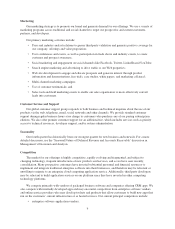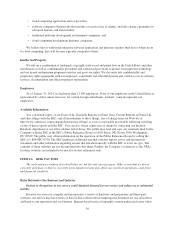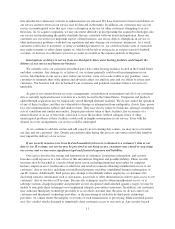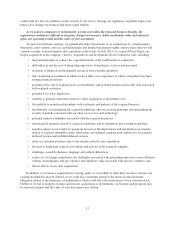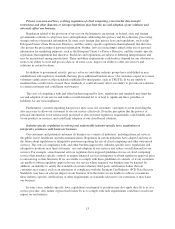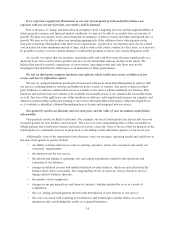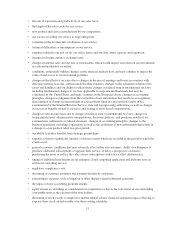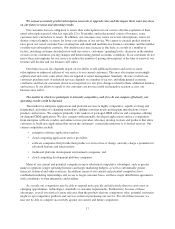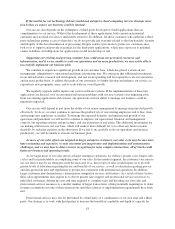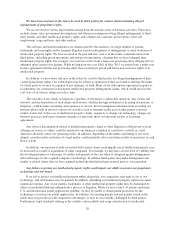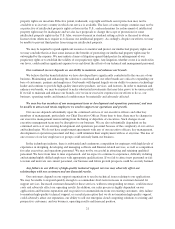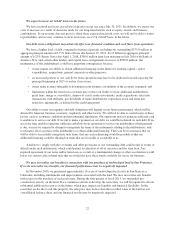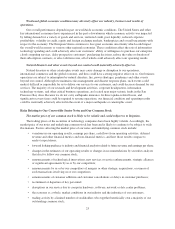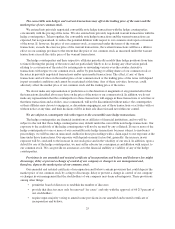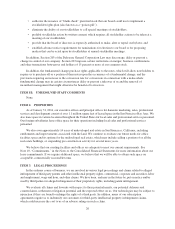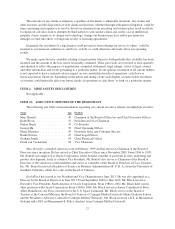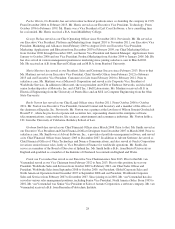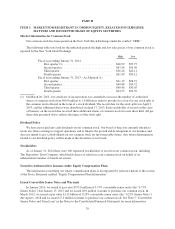Salesforce.com 2014 Annual Report Download - page 23
Download and view the complete annual report
Please find page 23 of the 2014 Salesforce.com annual report below. You can navigate through the pages in the report by either clicking on the pages listed below, or by using the keyword search tool below to find specific information within the annual report.delivery of these services to our customers. If a customer is not satisfied with the quality of work performed by
us or a third party or with the type of services or solutions delivered, then we could incur additional costs to
address the situation, the profitability of that work might be impaired, and the customer’s dissatisfaction with our
services could damage our ability to obtain additional work from that customer. In addition, negative publicity
related to our customer relationships, regardless of its accuracy, may further damage our business by affecting
our ability to compete for new business with current and prospective customers.
Periodic changes to our sales organization can be disruptive and may reduce our rate of growth.
We periodically change and make adjustments to our sales organization in response to market opportunities,
competitive threats, management changes, product introductions or enhancements, acquisitions, sales
performance, increases in sales headcount, cost levels and other internal and external considerations. In the past,
these changes sometimes resulted in a temporary lack of focus and reduced productivity; these effects could recur
in connection with any future sales changes we might undertake and our rate of revenue growth could be
negatively affected. In addition, any significant change to the way we structure our compensation of our sales
organization may be disruptive and may affect our revenue growth.
Sales to customers outside the United States expose us to risks inherent in international sales.
We sell our service throughout the world and are subject to risks and challenges associated with
international business. Historically, sales in Europe and Asia Pacific together have represented approximately
30 percent of our total revenues, and we intend to continue to expand our international sales efforts. The risks and
challenges associated with sales to customers outside the United States include:
• localization of our service, including translation into foreign languages and associated expenses;
• laws and business practices favoring local competitors;
• compliance with multiple, conflicting and changing governmental laws and regulations, including
employment, tax, privacy, anti-corruption, import/export, antitrust, data protection and industry-
specific laws and regulations, including rules related to compliance by our third-party resellers;
• pressure on the creditworthiness of sovereign nations, particularly in Europe, where we have customers
and a balance of our cash, cash equivalents, and marketable securities. Liquidity issues or political
actions by sovereign nations could result in decreased values of these balances;
• regional data privacy laws and other regulatory requirements that apply to outsourced service providers
and to the transmission of our customers’ data across international borders;
• treatment of revenue from international sources and changes to tax codes, including being subject to
foreign tax laws and being liable for paying withholding income or other taxes in foreign jurisdictions;
• foreign currency fluctuations and controls;
• different pricing environments;
• difficulties in staffing and managing foreign operations;
• different or lesser protection of our intellectual property;
• longer accounts receivable payment cycles and other collection difficulties;
• natural disasters, acts of war, terrorism, pandemics or security breaches; and
• regional economic and political conditions.
Any of these factors could negatively impact our business and results of operations.
Additionally, our international subscription fees are paid either in U.S. dollars or local currency. As a result,
fluctuations in the value of the U.S. dollar and foreign currencies may make our service more expensive for
international customers, which could harm our business.
19


